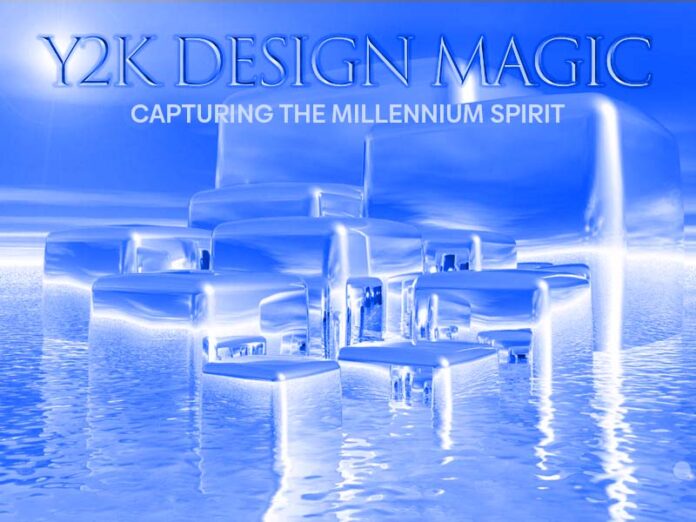Imagine a time when the world was on the brink of a new millennium, and the air was filled with both excitement and uncertainty. It was an era when pop culture, technology, and design collided in a spectacular display of creativity and optimism. This era gave birth to a unique and captivating design style known as Y2K design, short for “Year 2000 design.”
In this detailed blog, we’ll peel back the layers of Y2K design, dissecting its origins, characteristics, and enduring influence on the world of aesthetics.
But what exactly is Y2K design?
Y2K design, short for “Year 2000 design,” is a design style that emerged in the late 1990s and early 2000s, leading up to the year 2000. It’s a visual celebration of the transition from the 20th century to the 21st, embracing the optimism, technology, and pop culture of that time. It’s more than just a blend of colors and fonts; it’s a portal to an era when optimism about the future collided head-on with the relics of the past.

A Step-by-Step guide on how to create a Y2K-Inspired Design
Creating Y2K-inspired graphic design is like embarking on a nostalgia-filled adventure. Here’s how to do it:
Step 1: Research and Inspiration
Begin by immersing yourself in Y2K design inspiration. Explore magazines, websites, movies, and music videos from the late ’90s and early 2000s. Look for design elements like vibrant colors, unique fonts, and digital aesthetics that define Y2K style.

Step 2: Color Palette
Choose a bold and vibrant color palette reminiscent of the Y2K era. Think neon pinks, electric blues, lime greens, and sunny yellows. Don’t limit yourself – let your creativity soar with unusual color selections.

Step 3: Typography
Select fonts that reflect the futuristic and quirky style of Y2K design. Consider fonts with loopy, geometric, or even pixelated elements. Popular choices include fonts like “Impact,” “Bauhaus 93,” or “Chicago.”
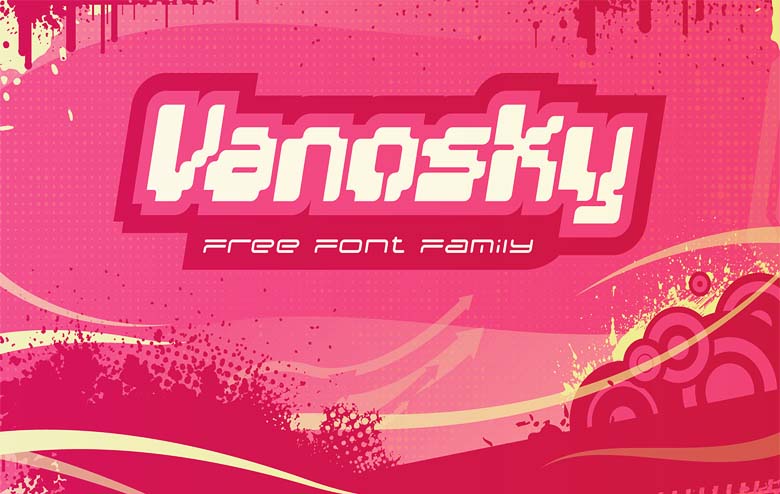
Step 4: Graphic Elements
Incorporate graphic elements that scream Y2K!! You can use pixelated graphics, abstract shapes, and tech-inspired motifs like CD-ROMs, retro computers, or early internet icons. These elements should add a digital and futuristic touch to your design.

Step 5: Layout and Composition
Experiment with layout and composition. Y2K design often features asymmetry, overlapping elements, and a playful disregard for traditional design rules. Try unconventional arrangements and layering to achieve the desired look.
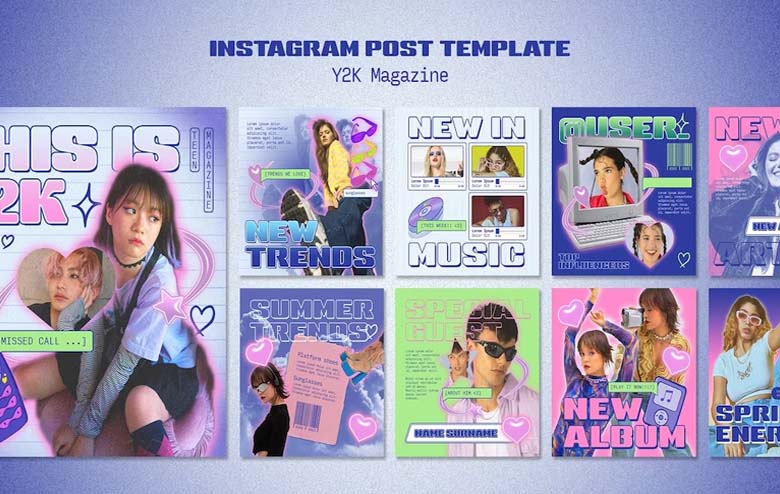
Step 6: Glitch and Digital Effects
Embrace digital effects like glitches, pixelation, and distortion to add an authentic Y2K feel. These effects can be applied to text, images, or backgrounds to create a sense of technological nostalgia.
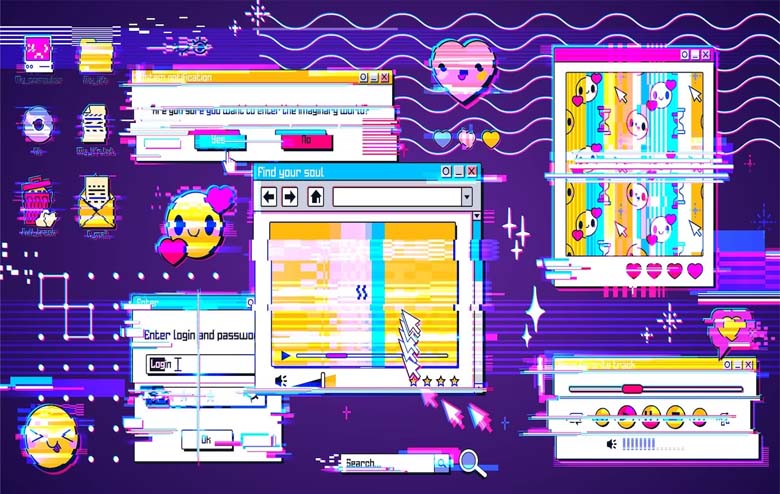
Step 7: Use Patterns and Textures
Y2K design often incorporates bold patterns and textures. Consider using retro-inspired patterns like checkerboards, gradients, or metallic textures to enhance your design.

Step 8: Blend Retro and Futuristic
Balance retro elements with futuristic touches. Mix vintage imagery with digital aesthetics to capture the Y2K spirit, which was all about looking back while moving forward.

A few important pointers to keep in mind while you design:
- Don’t be afraid to experiment and iterate. Test different color combinations, fonts, and effects to find the perfect Y2K-inspired design that resonates with your vision.
- Y2K design can be applied to various mediums, including posters, websites, social media graphics, and even fashion. Adapt your design to the specific medium you’re working on while keeping the Y2K aesthetic intact.
- Remember that Y2K design is all about embracing the spirit of the era. Stay true to the bold, unconventional, and optimistic style that defined the turn of the millennium.
By following these steps and channeling your creativity, you can create captivating Y2K-inspired designs that transport your audience back to a time when the future was as colorful and exciting as the design itself.
What are the Characteristics of Y2K Design?
Y2K design has some distinctive characteristics that make it stand out, here are they:
Futuristic Elements: Y2K design often incorporates futuristic and space-age elements, reflecting the excitement about the new millennium.
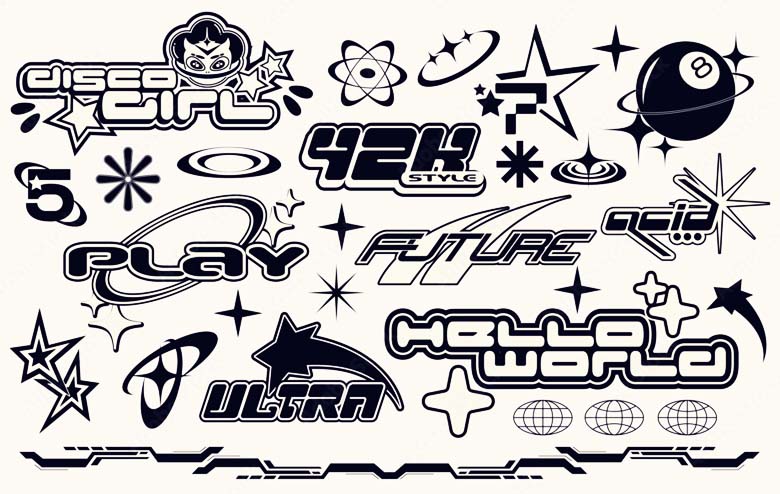
Digital Aesthetics: With the rise of the internet, Y2K design frequently includes digital and pixelated elements.
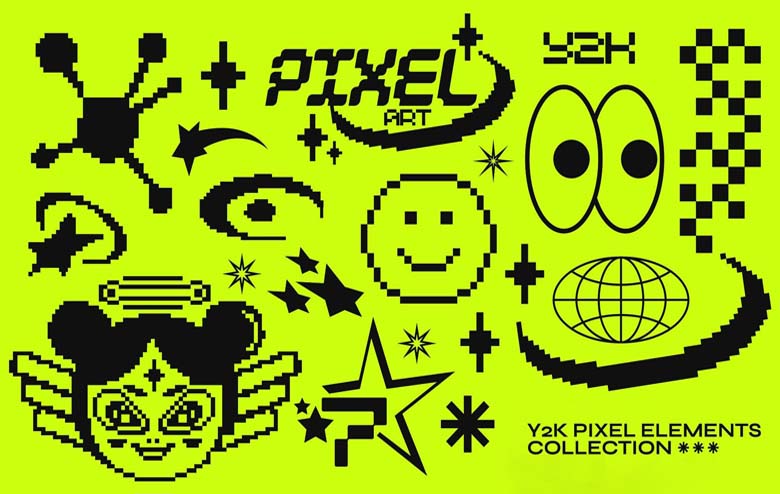
Vibrant Colors: Bright, eye-catching colors, often in unconventional combinations, are a hallmark of Y2K design.

Retro Futurism: It combines a love for retro styles with a vision of the future, creating a unique blend of nostalgia and optimism.

FAQ
Ques 1: Is Y2K a type of Aesthetic?
Ans: Yes, Y2K is indeed a type of aesthetic. It’s a visual style that harkens back to the turn of the millennium, celebrating the unique blend of nostalgia and futuristic optimism of that era.
Ques 2: What is Y2K Art Called?
Ans: Y2K art doesn’t have a specific name, but it’s often referred to simply as “Y2K design” or “Y2K aesthetic.”
Ques 3: Why was Y2K Scary?
Ans: The Y2K scare, also known as the “Millennium Bug,” was a fear that computer systems worldwide would malfunction when the year changed from 1999 to 2000 due to the way dates were programmed. This fear arose because many computer systems used two-digit years (e.g., ’99 for 1999), and it was uncertain how they would interpret ’00 for 2000. While extensive preparations were made, the actual impact turned out to be less severe than feared.
In Summary
You see it’s all about vibrant colors, funky fonts, and a love for both the past and the possibilities of tomorrow. So, dust off your old Nokia cell phone, pop in a CD, and immerse yourself in the quirky, captivating world of Y2K design. Whether you’re a design enthusiast or just feeling a little nostalgic, Y2K design will transport you back to a time when the internet was young, and the future was full of promise.
Give it a try today!
We hope this article will be helpful to you. Stay tuned for upcoming articles.
READ MORE: Timeless Retro Line Art Vintage Beauty Rediscovered
If you like our article, please subscribe to BsyBeeDesign for the latest updates on design. If we forget anything, share your creative ideas in the comments section.
Follow us on Facebook, Linkedin, Instagram, Pinterest and YouTube.

